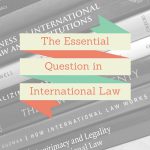The second best book to review on this blog? A book that combines almost everything I am interested in these days. Enter ’The Court and the World’ by US Supreme Court Justice Stephen Breyer. International and US (Constitutional) Law, US politics, compliance theory, globalization and so on and so forth. This book brings together all these things by examining the impact of all kinds of ’foreignness’ on American Law and the work of judges, including the Supreme Court. And throughout, Justice Breyer is trying to let that ‘foreignness’ make a soft landing in American society.
The Court and dealing with legal ’foreignness’
Justice Breyer builds up his main argument in a way that ensures maximum acceptance of what he has to say. He wants to ease, massage his American readership into accepting his main argument: In this globalized, interdependent world America and Americans cannot escape from being affected by people and events beyond America’s shores. In this book, Justice Breyer argues that as a consequence it is only proper and necessary that the courts take note and become cognizant of international and foreign law; other legal principles, concepts and techniques. One can imagine that Justice Antonin Scalia is still fuming in his grave. But this is the theme of the book, and not totally unexpected from one of the more or less liberal justices on the Court. That is, if you assume that liberals are more internationalist in outlook.
Justice Breyer and legal reality
But Justice Breyer is also eminently practical in his approach to the law and that practicality he also applies to the strategy in the book. ’A more harmonizing understanding and application of American law to foreign activities is not the same as American courts deciding cases on the basis of foreign law’ (p. 93). This is an example of Justice Breyer’s soothing words for worried readers. But what may these readers be worried about? Towards the end of the book, Justice Breyer acknowledges and professes to share the some concern: ’It is a concern for American sovereignty.’ (p. 244) Moreover, he reveals his strategy and the reasons for it on the same page.
’My hope is that the cases I’ve now discussed suggest that the critics concerns about judicial references to foreign law are beside the point. Their fears don’t much resonate when one understands the way in which foreign law and practice are actually considered. They do not respond directly to the kinds of of internationally related legal problems that American judges are now asked to dive into and resolve. It is not the cosmopolitanism of some jurists that seeks this kind of engagement but the nature of the world itself that demands it.’ (p. 244-245)
In other words, foreign aspects of legal cases are a fact of life, so we have to deal with them. And relax, just look closely at how we deal with them.
Justice Breyer’s awareness campaign
The glide path into making Americans accept all those foreign influences in the American legal system, Justice Breyer starts with familiar territory, albeit not entirely on point of the rest of the book. What is the role of the courts in matters of national security, particularly in wartime? The willingness of the US Supreme Court to review and limit executive authority did not start after 9/11 and the War on Terror, but was already established in a long history of cases. ’No Blank Check’ is the title of one chapter. Enough said.
Justice Breyer then continues with a review of how overseas events and persons enter US courts, and how US law enters the regulation of international commerce. By way of the subject of treaty interpretation and the treaty power under the US Constitution, Justice Breyer starts to investigate and explain how foreign legal principes and case law enter the discussion in US legal cases, with all due caution of course. But is in the final chapters where Justice Breyer shows his true colors. If the rigid sovereigntists are not incensed about how Justice Breyer tried to nuance his way into convincing them to accept foreign law and cases, they will froth at the mouth to learn of the level of interactions between American and foreign judges; meaningful exchanges between legal professionals who may learn from each other in a common purpose to advance the rule of law. Don’t tell anyone.
No apologies
The circumspect nature of Justice Breyer’s argument is to be applauded in the face of his potentially suspicious readership. He notes that all these foreign influences should be allowed to uphold American values and the American Constitution. That sounds paradoxical to me, because Justice Breyer’s own point is that the nature of the world demands a more global outlook! Inevitably, by taking note of other states, other legal systems, and other legal values, American values will change over time. Abortion, same-sex marriage, gun control, climate change, death penalty. These are examples of how American values have changed or are changing, and I would argue, they have done so because of foreign influences. So the rigid sovereigntists do have a point. But I would support Justice Breyer’s point: In this world it is only natural and it is inevitable.



